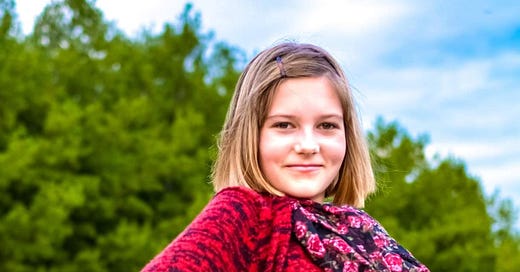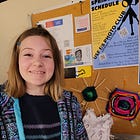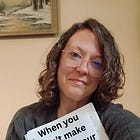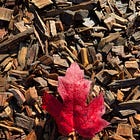"A candle can spread fire like love."
Felicity once told me, "The little things can be huge things."
Felicity told me that, to her, the poem means “we can come together in hard times by sharing our uniqueness through creativity.”
For an audio version of this essay, please listen here:
Once, Felicity told me, “Little things can be huge things. A candle can spread a huge fire like love.” She was eleven or twelve at the time.
During the same year, she asked, “Can our bad choices ruin the world?”
That’s how concerned my oldest is about kindness, or the lack thereof, and its effects on others.
Since she first learned to speak, I’ve recorded everything she verbalized that struck me, from hilarious to profound, and memorialized these developmental markers in my annual family scrap books. Each of my five has their own list, what I call their “—isms,” the thoughts and ideas particular to each kid’s personality.
Sarah tends to blurt outrageous, incongruent, and funny questions or comments, often stemming from her innocence. The youngest three still see life through a literal lens, so their remarks are cute. Case in point: When Ben and I took the kids on a hike by the Maumee River, Veronica asked, “Can we see the Daddy River, too?” She was three.
But it’s Felicity whose wisdom astounds me, often emotionally arrests me. She’s the one who cares deeply about humans and animals and all living things. In her sensitive, perceptive way, she ponders what she observes or hears and internalizes everything into meaning.
Speaking of wisdom, a writer told me not long ago, “I don’t believe in wisdom.” There was no elaboration, but I assumed this was a philosophical perspective. Still, I disagree. Definitions of wisdom associate it with life experience, good judgment, and intelligence. I would add that even the young can be wise, if they notice things and possess the ability to sit with others in their pain.
Maybe wisdom is this abstract notion, and you are entitled to define it as you wish. Each of us comes to this table with preconceived ideas, prejudices, assumptions, and wounds. We have all been misunderstood. We all have been trained according to the traditions of our cultures and religions and families. Everything shapes what we believe about nebulous, theoretical constructs, like wisdom. Or love. Or forgiveness.
Often, it takes the questions or voiced musings of a child to render us speechless. Because we learn from them, yet don’t expect to. Not usually, anyway. Here’s what I’ve learned from Felicity: that the world in all its divisive vitriol still contains inherent goodness. She believes that we can come together somehow, that we can find our way back to each other, despite the messes we’ve made.
She wanted me to share another poem with you. Its central theme is on unity and discovering a path forward—through our collective suffering, in it, because of it. Somehow, at almost fourteen, she knows that we can’t pretend we aren’t broken. Instead, it’s precisely our broken nature that will bring us together, that will heal.
Who are we?
Are we strangers
Submissive to
Our own kind?Are we more
Than what others
Say we are?Or are we
Foreigners
From a strange land?We are powerful.
We are strong.We are kind,
Even if we toil
And grind our teeth
All day long.No matter what others say,
No matter the circumstances,
We are all one.Our uniqueness is combined
Into one.
Our hearts are
Intertwined.
Felicity told me that, to her, the poem means “we can come together in hard times by sharing our uniqueness through creativity.”
The world needs what you create. Maybe it’s cliche to say that art will heal the world, but can it also be true? That what you speak, or write, or paint, or dance, or sing can be the conduit for wholeness, for hope? Not just for the artist, but for the reader or viewer or listener. Through the process of any creative act, we are channeling the intense emotions we otherwise have difficulty expressing.
Giving life to your art becomes the gateway for important and meaningful conversations, further inspirations, or new ideas. Everyone has the capacity to imprint encouragement, insight, and strength onto someone’s heart. In that way, maybe Felicity’s vision will actualize. Maybe we all can finally understand that we belong together, that we are all part of the human family.
If you’d like to support my work but can’t commit to a monthly or annual subscription, you can make a one-time donation as a tip here.
If you enjoyed reading this, you might also like to check out these other essays I’ve written:









I just moved from Indiana to Kentucky. I am grateful for crossing your Substack!
Felicity is no doubt a WRITER. Poor Bubbie!*
*I once had a professor say this to me after reading one of my short stories. RIP Professor Diana George.